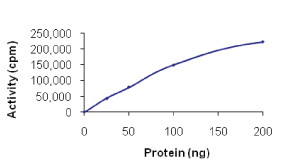
CLK2, Active(C58-11G)
FOR BULK ORDER REQUESTS PLEASE CONTACT US
Description :Recombinant human CLK2 (137-end) was expressed by baculovirus in Sf9 insect cells using an N-terminal GST tag.
Species :Human
Tag :GST tag
Expression System:Sf9 insect cells using baculovirus
Sequence :137-end
Genbank Number :NM_003993
Specific Activity :Sample Kinase Activity Plot. For specific information on a given lot, see related technical data sheet.
Purity :Sample Purity Data. For specific information on a given lot, see related technical data sheet.
Storage, Stability and Shipping :Store product at –70oC. For optimal storage, aliquot target into smaller quantities after centrifugation and store at recommended temperature. For most favorable performance, avoid repeated handling and multiple freeze/thaw cycles.
Applications :Kinase Assay, Western Blot
Molecular Weight :~68 kDa
Gene Aliases :hCLK2, MGC61500
Scientific Background :CDC-like kinase 2 (CLK2) a family of autophosphorylating kinases termed CLK (CDC2/CDC28-like kinases) was shown to phosphorylate SR proteins and to influence alternative splicing in overexpression systems (1). Recent findings demonstrated that the CLK kinases activate PTP-1B family members, and this phosphatase may be an important cellular target for CLK action. Mutations in the clk-2 proteins affect organismal features such as development, behavior, reproduction, and aging as well as cellular features such as the cell cycle, apoptosis, the DNA replication checkpoint, and telomere length (2).
References :
1. Jiang, N. et al: Human CLK2 links cell cycle progression, apoptosis, and telomere length regulation. J. Biol. Chem. 2003;278(24):21678-84.
2. Nayler, O. et al: The cellular localization of the murine serine/arginine-rich protein kinase CLK2 is regulated by serine 141 autophosphorylation. J. Biol. Chem. 1998;273(51):34341-8.
Product Sheets (By Lot #) :
Research Areas :Cancer, Cardiovascular Disease, Cell Cycle, Ser/Thr Kinases, Cancer, Cardiovascular Disease, Cell Cycle, Ser/Thr Kinases
